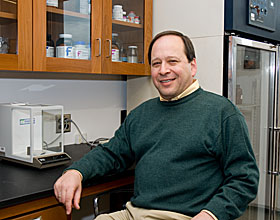  |
| HOME | THIS ISSUE | CALENDAR | GRANTS | BACK ISSUES | < BACK | NEXT > |
Biologist engaged in national debate over theory of evolution by Cindy Weiss - January 16, 2007 |
||||
| Kent Holsinger, professor of ecology and evolutionary biology, has seen his role evolve this year, from researching and teaching evolutionary biology to speaking out nationally on behalf of the theory on which it is based-evolution. As president of the American Institute of Biological Sciences (AIBS) in 2006, Holsinger led a group dedicated to supporting biology teaching and research and to making sure that biology education grounds pre-college students in the theory of evolution. The AIBS, which has 5,000 individual members and a quarter of a million members in its affiliated organizations, lobbies for federal funding to agencies such as the National Science Foundation and the U.S. Department of Agriculture for biology research. With the National Center for Science Education in Oakland, Calif., the AIBS has been active in developing list serves to connect people who are interested in evolution education. It also advises policymakers on issues in the biological sciences. Last year, Holsinger was one of the organizers of an NSF workshop on the frontiers of evolutionary biology, a two-day brain- storming session to advise the NSF on what the evolutionary biology community sees as the critical issues. And this year, as past president of AIBS, he is organizing a symposium on evolution in human populations for the next meeting of the National Association of Biology Teachers, in collaboration with the National Evolutionary Synthesis Center in North Carolina. In the 1960s, an offshoot of the AIBS, the Biological Sciences Curriculum Study, was formed to develop a comprehensive, pre-college curriculum with evolution as a central theme. Creationism, a theory based in religion, emerged as a political force shortly after that - perhaps in response. Opponents of evolution have succeeded in framing evolution as a controversial theory, Holsinger says, one that, in the interest of fairness, should not be presented without an alternative. Intelligent design, the successor to creationism, is a threat to all science teaching, not just to evolution, he says. The theory suggests that life on Earth must have been designed by an intelligent agent or agents.
It attempts to present itself as a scientific alternative, notes Holsinger. But, he says, its proponents have failed to present any new predictions that can explain natural phenomena and be tested by other researchers, as the scientific method would require. Despite court cases rebuffing the teaching of creationism, and the failure of proponents of the theory of intelligent design to make a scientific case, people are still sympathetic to teaching an alternative viewpoint, he notes. "We don't ask geographers to teach flat world theory anymore," he says. Evolution arouses fears such as, if you believe in evolution, you have to deny the existence of God or equate humans and apes, says Holsinger. "The teaching of evolution says something very fundamental about us as human beings," he adds. "It tells us, at a fundamental level, we're part of nature." Some, however, view humans as a species apart, and may worry that accepting humans as animals would mean rejecting human ethics and morals. "If you hold these misunderstandings, accepting evolution is very threatening," says Holsinger. Although he would like to think the climate is getting better for teaching evolution in the public schools, he suspects that even when the theory is covered in biology texts, for some teachers, "It might be the thing you just don't quite get to in class." Still, he says, a federal district court judge's decision in Dover, Pa. last year that teaching intelligent design violates the First Amendment means "it's going to be extraordinarily difficult to put forward intelligent design as a legitimate alternative to be taught in high school biology classes." |
| ADVANCE HOME |

